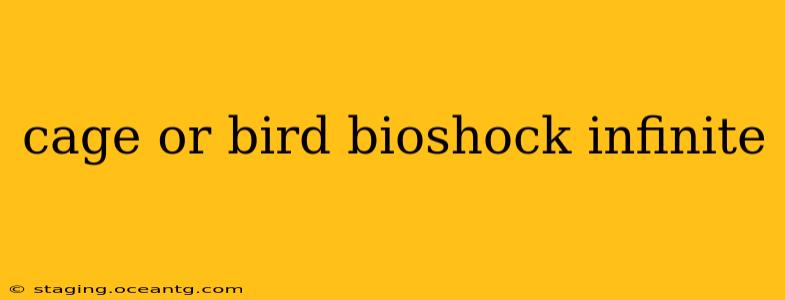Bioshock Infinite, while lauded for its stunning visuals and gripping narrative, leaves players grappling with a complex moral dilemma centered around its two key female characters: Elizabeth and the Luteces. This isn't simply a "good versus evil" scenario; instead, it's a nuanced exploration of free will, determinism, and the very nature of choice. The "cage or bird" metaphor frequently surfaces in discussions, encapsulating the debate surrounding Elizabeth's agency within the game's intricate plot. Was she a prisoner, a pawn, or something more? Let's delve into this central theme and explore some frequently asked questions.
Was Elizabeth a Bird or a Cage?
This question lies at the heart of understanding Elizabeth's character. On one hand, she's clearly been held captive for most of her life, subjected to Comstock's manipulative control and the constraints of Columbia. This imprisonment, both physical and psychological, makes a compelling case for her being a "bird in a cage," stifled and yearning for freedom. Her early interactions, marked by hesitant speech and a frightened demeanor, support this interpretation.
However, as the game progresses, Elizabeth reveals a remarkable resilience and cunning. She demonstrates resourcefulness, strategic thinking, and an increasing sense of agency. Her powers, though seemingly bestowed upon her, are utilized with her own volition, often defying Comstock's expectations and even subverting his plans. Her ability to manipulate tears in reality, to choose which realities to visit, and even to directly challenge Comstock hint at a more empowered figure, less a passive bird and more a complex being navigating a predetermined cage. This duality makes it difficult to definitively label her as either "bird" or "cage."
What Role Do the Luteces Play in Elizabeth's Fate?
The Luteces, twin siblings Robert and Rosalind, are pivotal to Elizabeth's story. They are the architects of her existence, manipulating the timelines and creating the very circumstances that confine her. Yet, their motivations remain ambiguous. Are they benevolent, striving to free Elizabeth from Comstock's tyranny? Or are they simply detached observers, manipulating events for their own esoteric reasons? Their actions are both helpful and harmful to Elizabeth, complicating any easy categorization of their role. They represent a crucial element in the "cage or bird" debate. Were they building a cage, or were they providing the tools for a bird to break free?
How Does Elizabeth's Agency Change Throughout the Game?
Elizabeth’s development is key to understanding the cage/bird dichotomy. She begins the game as a seemingly fragile captive. Gradually, through her interactions with Booker, her exposure to the outside world, and the increasing use of her powers, Elizabeth gains a sense of self and asserts her own will. Her actions are not always predictable, showing initiative and even strategic manipulation of situations to achieve her own goals. This growth doesn't erase the past trauma of her imprisonment, but it shows a powerful transition from a confined bird to a powerful being actively shaping her future.
Is Elizabeth's Free Will an Illusion?
This is a philosophical question at the core of the Bioshock Infinite narrative. The concept of multiple realities and the Luteces' manipulation raise questions about the nature of free will. If Elizabeth's life is but one iteration amongst countless possibilities, does her agency truly hold weight? The game presents this as a complex, unresolved question, forcing players to confront the philosophical implications of determinism versus free will. The "cage" could be interpreted as the pre-determined course of events, while the "bird" represents Elizabeth's capacity to affect those events and carve her own path, despite the limitations imposed.
Does Elizabeth's Choice Truly Matter?
The ending of Bioshock Infinite offers a chilling reflection on the player's actions and their consequences. Regardless of the player's choices, the possibility of a "bird's" freedom exists. However, the question of whether the choices truly matter remains open-ended. This ambiguity is a powerful reflection of the "cage or bird" dilemma. Elizabeth's fate is tied up with the choices Booker makes, and the impact of those choices resonates with the weight of determinism and the illusion of choice.
In conclusion, the "cage or bird" metaphor is not a simple binary. Elizabeth's character arc is a journey of transformation, a struggle for agency and self-discovery within a predetermined, yet ultimately malleable, framework. The game forces players to confront the complexities of free will, determinism, and the ambiguous nature of choices, leaving the ultimate interpretation to the player.
